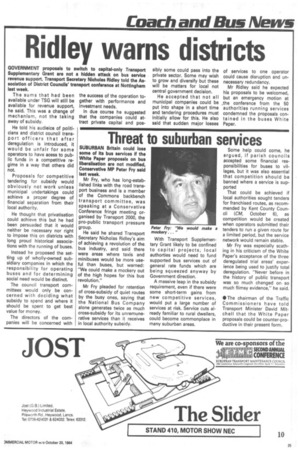Threat to suburban services
Page 27

If you've noticed an error in this article please click here to report it so we can fix it.
SUBURBAN Britain could lose some of its bus services if the White Paper proposals on bus liberalisation are not modified, Conservative MP Peter Fry said last week.
Mr Fry, who has long-established links with the road transport business and is a member of the Commons backbench transport committee, was speaking at a Conservative Conference fringe meeting organised by Transport 2000, the pro-public transport pressure group.
He said he shared Transport Secretary Nicholas Ridley's aim of achieving a revolution of the bus industry, and said there were areas where taxis and minibuses would be more useful than buses, but warned: "We could make a mockery out of the high hopes for this bus revolution."
Mr Fry pleaded for retention of cross-subsidy of quiet routes by the busy ones, saying that the National Bus Company alone generates twice as much cross-subsidy for its unremunerative services than it receives in local authority subsidy. With Transport Supplementary Grant likely to be confined to capital projects, local authorties would need to fund supported bus services out of general rate funds which are being squeezed anyway by Government direction.
A massive leap in the subsidy requirement, even if there were some short-term gains from new competitive services, would put a large number of services at risk. Service cuts already familiar to rural dwellers, could become commonplace in many suburban areas. Some help could come, he argued, if parish councils accepted some financial responsibilities for buses to villages, but it was also essential that competition should be banned where a service is supported
That could be achieved if local authorities sought tenders for franchised routes, as recommended by Kent County Council (CM, October 6), as competition would be created when operators submitted their tenders to run a given route for a limited period, but the service network would remain stable.
Mr Fry was especially scathing in his criticism of the White Paper's acceptance of the three deregulated trial areas' experience being used to justify total deregulation. "Never before in the history of public transport was so much changed on so much flimsy evidence," he said.
• The chairman of the Traffic Commissioners have told Transport Minister David Mitchell that the White Paper proposals could be counter-productive in their present form.
































































































































































































































